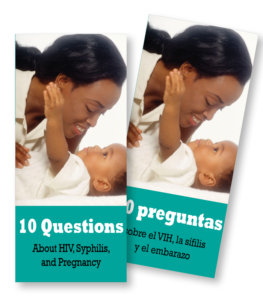FAQs
Congenital syphilis (CS) is a disease that occurs when a mother with syphilis passes the infection on to her baby during pregnancy.
CS can have major health impacts on your baby. How CS affects your baby’s health depends on how long you had syphilis and if — or when — you got treatment for the infection.
CS can cause:
- Miscarriage (losing the baby during pregnancy),
- Stillbirth (a baby born dead),
- Prematurity (a baby born early),
- Low birth weight, or
- Death shortly after birth.
Up to 40 percent of babies born to women with untreated syphilis may be stillborn, or die from the infection as a newborn.
Babies born with CS may experience:
- Deformed bones,
- Severe anemia (low blood count),
- Enlarged liver and spleen,
- Jaundice (yellowing of the skin or eyes),
- Brain and nerve problems, like blindness or deafness,
- Meningitis, and
- Skin rashes.
No. It is possible that a baby with CS won’t have any symptoms at birth. But without treatment, the baby may develop serious problems. Usually, these health problems develop in the first few weeks after birth, but they can also happen years later.
Babies who do not get treatment for CS and develop symptoms later on can die from the infection. They may also be developmentally delayed or have seizures.
After a steady decline from 2008–2012, data show a sharp increase in CS rates. In 2018, the number of CS cases was the highest it’s been since 1995.
Public health professionals across the country are very concerned about the growing number of congenital syphilis cases in the United States. It is important to make sure you get tested for syphilis during your pregnancy.
Yes. All pregnant women should be tested for syphilis three times during their pregnancy – at the first prenatal visit (the first time you see your doctor for health care during pregnancy); during the third trimester no earlier than 28 weeks gestation; and again at delivery.
Keep in mind that you can have syphilis and not know it. Many people with syphilis do not have any symptoms. Also, syphilis symptoms may be very mild, or be similar to signs of other health problems. The only way to know for sure if you have syphilis is to get tested.
The CDC has indicated that the vaccine may be administered to those who are pregnant. Additionally, several professional societies have advocated for pregnant people to be vaccinated. However, if you have questions or concerns, you should discuss them with your healthcare provider. The CDC says those who are pregnant should weigh the following when deciding whether to get the vaccine:
- your individual risk of acquiring the virus (both to community transmission and your occupation)
- the potential damaging health outcomes of contracting COVID-19 while you’re pregnant
- the side effects that you may experience after receiving the vaccine
- the safety and efficacy data currently available.
Yes. Syphilis can be treated and cured with antibiotics. If you test positive for syphilis during pregnancy, be sure to get treatment right away. Also, it is highly recommended that anyone diagnosed with Syphilis complete the entire prescribed treatment regimen prescribed by their doctor or healthcare provider.
If you are diagnosed with and treated for syphilis, your doctor should do follow-up testing for at least one year to make sure that your treatment is working.
- Follow all instructions related to treatment and follow-up visits.
- Avoid sexual contact until you get your health care provider OK!
- Ask your local or state health department about partner notification. Your partner(s) should get tested and treated (if needed), too.
Your doctor must consider several factors to determine if your baby has CS. These factors will include the results of your syphilis blood test and, if you were diagnosed with syphilis, whether you received treatment for syphilis during your pregnancy. Your doctor may also want to test your baby’s blood, perform a physical exam of your baby, or do other tests, such as a spinal tap or an x-ray, to determine if your baby has CS.
Centers for Disease Control and Prevention (CDC) has specific recommendations for your healthcare provider on how to evaluate babies born to women who have positive syphilis tests during pregnancy. See CDC website for more information.
Yes. There is treatment for CS. Babies who have CS need to be treated right away — or they can develop serious health problems. Depending on the results of your baby’s medical evaluation, he/she may need antibiotics in a hospital for 10 days. In some cases, only one injection of antibiotic is needed.
It’s also important that babies treated for CS get follow-up care to make sure that the treatment worked.
Your baby will not get CS if you do not have syphilis. There are two important things you can do to protect your baby from getting CS and the health problems associated with the infection:
- Get a syphilis test at your first prenatal visit.
- Reduce your risk of getting syphilis before and during your pregnancy.
Talk with your doctor about your risk for syphilis. Have an open and honest conversation about your sexual history and STI testing. Your doctor can give you the best advice on any testing and treatment that you may need.
Get a syphilis test at your first prenatal visit
If you are pregnant, and have syphilis, you can still reduce the risk of CS in your baby. Getting tested and treated for syphilis can prevent serious health complications in both mother and baby.
Prenatal care is essential to the overall health and wellness of you and your unborn child. The sooner you begin receiving medical care during pregnancy, the better the health outcomes will be for you and your unborn baby.
At your first prenatal visit, ask your doctor about getting tested for syphilis. It is important that you have an open and honest conversation with your doctor at this time. Discuss any new or unusual physical symptoms you may be experiencing, as well as any drugs/medicines you are using, and whether you have new or multiple sex partners. This information will allow your doctor to make the appropriate testing recommendations. Even if you have been tested for syphilis in the past, you should be tested again when you become pregnant.
If you test positive for syphilis, you will need to be treated right away. Do not wait for your next prenatal visit. It is also important that your sex partner(s) receive treatment. Having syphilis once does not protect you from getting it again. Even after you’ve been successfully treated, you can still be reinfected. For this reason you must continue to take actions that will reduce your risk of getting a new infection.
Reduce your risk of getting syphilis before and during your pregnancy
Preventing syphilis in women and their sex partners is the best way to prevent CS.
If you are sexually active, the following things can lower your chances of getting syphilis:
- Being in a long-term mutually monogamous relationship with a partner who has been tested for syphilis and does not have syphilis.
- Using latex condoms the right way every time you have sex. Although condoms can prevent transmission of syphilis by preventing contact with a sore, you should know that sometimes syphilis sores occur in areas not covered by a condom, and contact with these sores can still transmit syphilis.
Also, talk with your doctor about your risk for syphilis. Have an open and honest conversation with your doctor about your sexual history and about STI testing. Your doctor can give you the best advice on any testing and treatment that you may need.
Remember that it’s possible to get syphilis and not know it, because sometimes the infection causes no symptoms, only very mild symptoms, or symptoms that mimic other illnesses.
STI information and referrals to STI Clinics
CDC-INFO
1-800-CDC-INFO (800-232-4636)
TTY: 1-888-232-6348
In English, en Español
Resources:
CDC National Prevention Information Network (NPIN)
P.O. Box 6003
Rockville, MD 20849-6003
E-mail: npin-info@cdc.gov
American Sexual Health Association (ASHA)
P. O. Box 13827
Research Triangle Park, NC 27709-3827
919-361-8488
PENSHouston:
https://www.penshouston.org)
PENShouston is an innovative website designed by the Houston Health Department to aid in providing communities with easy access to free HIV/STIs testing, and also treatment where needed. PENShouston also provides HIV/STI prevention tips and facts about HIV and STIs.





